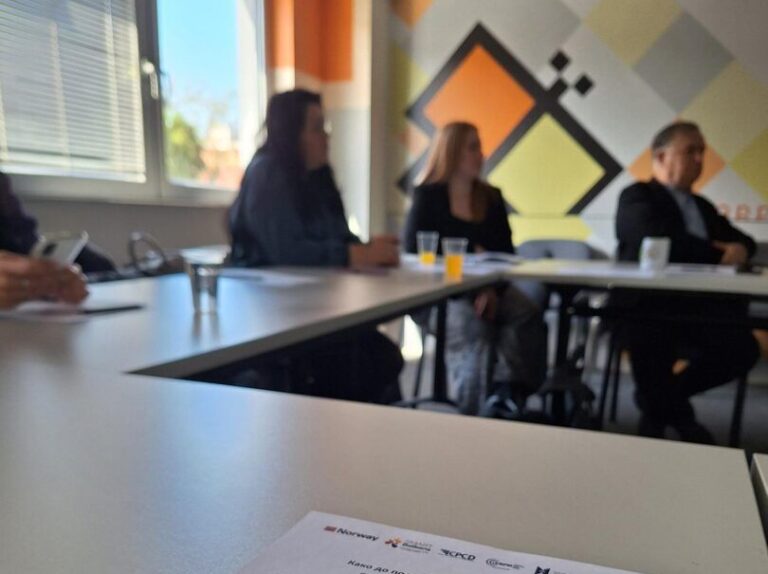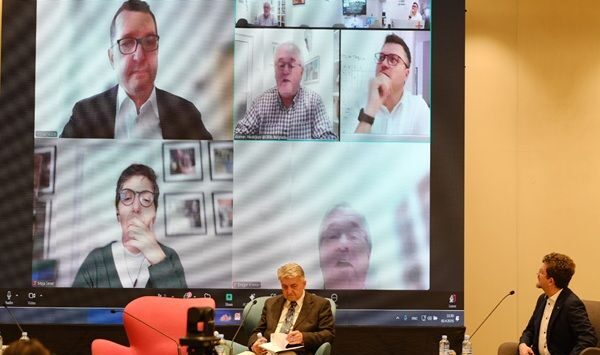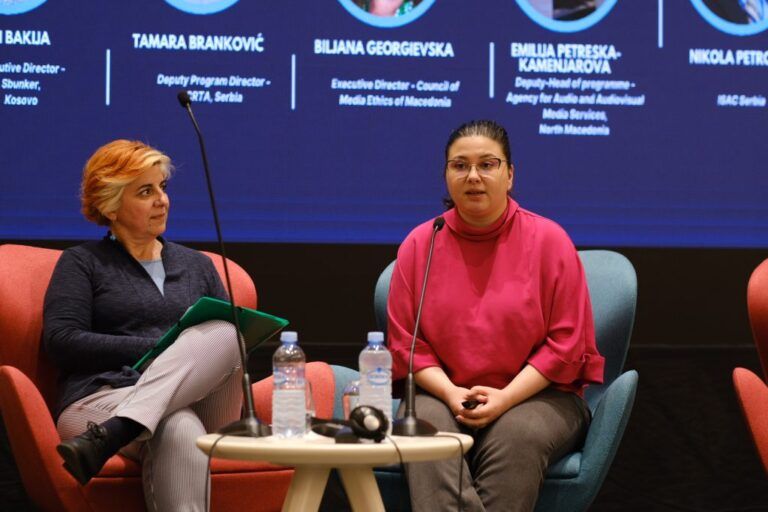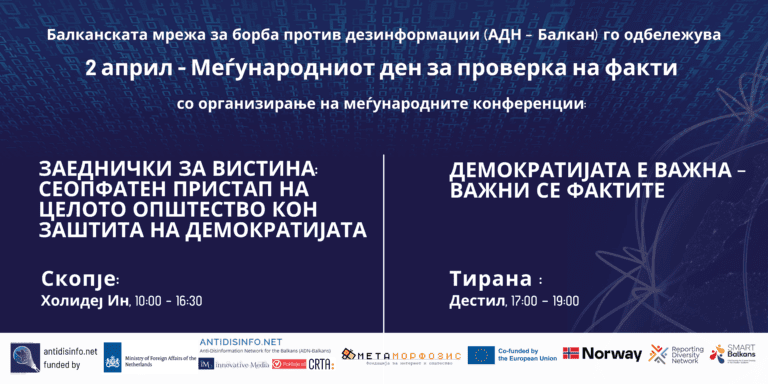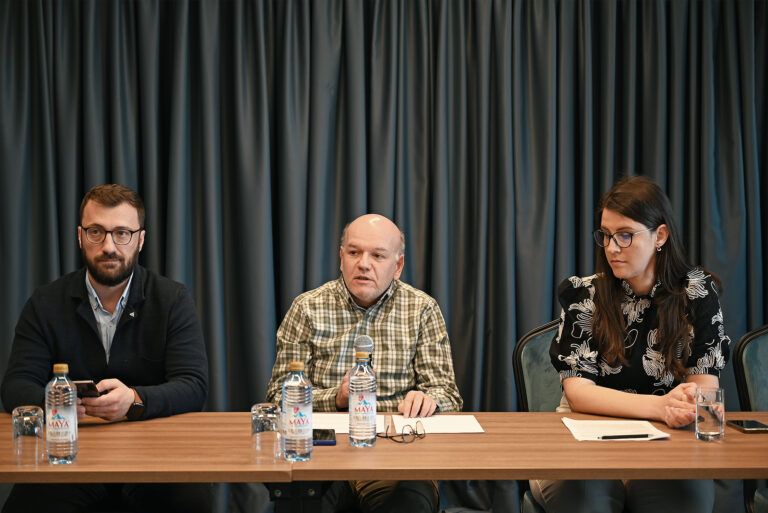Fact-checking is essential, but insufficient on its own. A multi-layered approach is needed, one that combines fact-checking and media literacy with cooperation between the media, non-governmental organizations, and government institutions. In other words, a comprehensive, whole-of-society approach to combating disinformation. This was one of the main ideas that emerged during the second part of the conference titled “Together for Truth: Whole-of-Society Approach to Safeguard Democracy,” organized by the Metamorphosis Foundation on the occasion of International Fact-Checking Day.
The session titled “Democracy at Risk: Fact-Checking and Content Moderation on Social Media—Facing Challenges by Creating Enabling Environment” discussed the state of fact-checking in the Western Balkans. Jona Plumbi, from the fact-checking organization Faktoje, noted that Albania is particularly vulnerable to disinformation.
“We are not prepared to combat disinformation. We are trying to prepare for the parliamentary elections in May, but it is not enough. A multifaceted approach to the problem is needed,” Plumbi said.
That is why, as Plumbi noted, Faktoje has started a collaboration with the University of Tirana to integrate media literacy into education, as the level of media literacy is very low. Plumbi also addressed another problem, how to reach an audience that is not interested in accurate information, that is, those who consume short content such as that found on TikTok. “When we wrote long analyses about disinformation regarding migrants in Albania, was anyone interested? No. We reached the most activity on 40-second videos,” Plumbi said.
Maida Ćulahović, from “Why Not” in Bosnia and Herzegovina, followed up with their own experience. Through the fact-checking services “Istinomer” and “Raskrinkavanje”, they tried to address the problem together with the platforms by following the code of practice, but without success:
“Without clear legislation, the platforms will do nothing, i.e. they will not voluntarily implement measures to address disinformation. During the last elections, we tried to work with the platforms for posts and content that violate the code of conduct [of Meta’s platforms], illegal content or one that contradicts the electoral code, and there was very little responsiveness. Out of 119 reported content, we received a response for only 25 of them. And only 3 were removed, but only after we appealed the initial decision,” shared Ćulahović.
Nacho Strigulev, from Blue Link, Bulgaria, followed up on the same topic, saying that we cannot rely on platforms to defend the information space, because they are, at the end of the day, profit-oriented companies:
“Platforms have no problem transforming themselves into weapons against democracy and the democratic order because such content brings clicks and interaction with the content. On the other hand, they make a profit through it.”
Strigulev further mentioned that such algorithms are everywhere and quoted Alexandra Giese, saying that such algorithms [e.g. “For You” pages] should be regulated, and turned off during election periods. Strigulev also drew attention to various chatbots that use artificial intelligence (AI) technology, and said that between 6 and 50 percent share disinformation that we know is linked to the Kremlin, including sharing sources from the “Pravda” network of pages. The network published an astronomical 3.6 million articles in 2024 alone.
The last speaker was Despina Kovachevska, from the Metamorphosis Foundation, and she concluded this discussion with a critical examination of hate speech and its relationship to disinformation:
“Hate speech justifies disinformation, increases stigma and bias. Especially when we have unprofessional media outlets that chase clicks and profit instead of thoroughly checking the facts, then I have a big problem,” Kovachevska shared.
In the end, there was a consensus that the Digital Services Act is the best path to harmonizing the domestic laws in the process of accession to the European Union. This process should not be done pro forma, but should be an inclusive and transparent process, especially if we want the big platforms to take this region more seriously–the speakers agreed.
The last session of the first day of the Metamorphosis International Conference, photo: Vancho Dzambaski
Business, sometimes, knows how to show integrity
The final discussion of the conference focused on “The Business Case for Information Integrity.” Opening remarks were given by the moderator of the discussion, Dragan Kremer, a media expert, who highlighted several examples from both Serbia and the United Kingdom, especially from the Sun newspaper and the Breitbart website in the United States, which have started to lose advertisers (i.e. companies that advertise in their media outlets) due to the content they publish. The companies have publicly renounced advertising, which they have also used as a kind of PR tool to present the values they stand behind. That is, the values they do not want to support or be associated with at all, such as those presented by Breitbart and the Sun, which have been spreading disinformation, racist, and xenophobic content.
Rasha Nedeljkov, the program director of Serbia’s Crta, followed up with the example of Happy TV, where almost the same thing happened. Several brands have canceled their advertisements from media outlets that very clearly share fake news and manipulated content–especially content related to the war in Ukraine.
However, the impact is not limited to domestic companies and brands only, it extends to international ones. Marko Milosavljević, a professor at the University of Ljubljana, explains that ads from international advertisers can be a double-edged sword.
“Just as this works for companies that fight against problematic content, there are also those that promote hate speech. What will happen in the EU and the Western Balkans, will major platforms start shutting down ads from media outlets that advocate for fact-checking, transparency and accuracy? There will be huge consequences for the media ecosystem,” Milosavljević pointed out.
He shared the example of companies that disagree with the policies of the Donald Trump administration and may be intimidated into reducing their advertising, and the money may be redirected to media outlets that spread disinformation and “stir up panic.”
Maja Sever, President of the European Journalist Federation, referred to other advertising from states and governments themselves, which can be the largest source of income for media outlets. According to Sever, there are no transparent criteria for government advertising, as shown in the research, where public funds are concentrated in just a few established media outlets, while independent media outlets receive not “a single denar.”
“This is due not so much to the content they publish, but to the editorial independence that the media outlets have. We need to find a way to establish responsible advertising as the norm, not the exception,” Sever said.
Vladimir Petreski, Editor-in-Chief of Truthmeter.mk, had the closing remarks. He emphasized that these things can be interpreted through the saying “vote with your wallet,” that is, to make choices according to what is most financially profitable. Petreski pointed to the example of X (formerly Twitter), saying:
“The company (X) has not recovered [financially] since Elon Musk took over. Companies began to collectively boycott content moderation decisions, after which Musk tried to sue advertisers.”
However, he emphasizes that the situation in Macedonia is different, because such a boycott can be (mis)used as a reason for a lawsuit, that is, it can be interpreted as an insult, damage to reputation, through so-called SLAPP lawsuits. On the other hand, another problem is the avalanche of digital and internet scams that have appeared across Macedonian social networks: “We see false advertisements and we see that they are in different languages throughout the region, most often for medical drugs,” says Petreski. But the problem with scams is that immediately after they are reviewed, they disappear and new ones appear. This is an indicator that they have good channels where they can sell information to data brokers or simply steal money from users.



